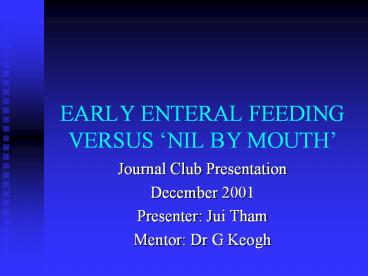EARLY ENTERAL FEEDING VERSUS - PowerPoint PPT Presentation
1 / 25
Title:
EARLY ENTERAL FEEDING VERSUS
Description:
Many patients are relatively undernourished prior to surgery. ... Searches were made of PubMed, Embase and Cochrane databases and further ... – PowerPoint PPT presentation
Number of Views:164
Avg rating:3.0/5.0
Title: EARLY ENTERAL FEEDING VERSUS
1
EARLY ENTERAL FEEDING VERSUS NIL BY MOUTH
- Journal Club Presentation
- December 2001
- Presenter Jui Tham
- Mentor Dr G Keogh
2
BACKGROUND
- Many patients are relatively undernourished prior
to surgery. - Physiological response to starvation glycogen,
proteins, fats as energy sources. - Nutritional depletion is an independent
determinant of serious complications post major
GI surgery. - Enteral nutrition versus TPN
- Is early enteral nutrition safe? If so, could it
be clinically beneficial?
3
SEARCH
- Medline search.
- Keywords enteral nutrition and randomized
controlled trials (limited to english and human) - Results 8 articles (7 reviews and 1
meta-analysis.
4
Early enteral feeding versus nil by mouth after
gastrointestinal surgery systematic review and
meta-analysis of controlled trials
- Authors SJ Lewis, M Egger, PA Sylvester, S
Thomas. - Objective To determine if a period of starvation
post GI surgery is beneficial. - Rationale of NBM post GI surgery is to prevent
post-op NV and to protect an anastomosis. - Post-op dysmotility predominantly affects stomach
and colon the small bowel recovers function 4-8
hours post-laporotomy.
5
Method of Selection
- Eligibility criteria Elective GI surgery with
patients randomly allocated to receive either
enteral feeding (within 24 hrs of surgery) or
NBM/IV fluids with introduction of enteral fluids
and diet as tolerated. - Searches were made of PubMed, Embase and Cochrane
databases and further unpublished data was sought
with letters sent to pharmaceutical companies and
authors of the trials included in the study.
6
Outcomes Analysed
- Anastomotic dehiscence
- Infection of any type
- Wound infection
- Pneumonia
- Intra-abdominal abscess
- Vomiting
- Mortality
- Length of hospital stay
7
Results
- 13 randomised controlled trials were found. 2
were excluded as no information on relevant
outcomes was given. - Additional unpublished data was obtained for 6 of
the remaining 11 studies.
8
Characteristics of the 11 trials
9
Comment on Quality of Trials
- Only 4 of the trials outlined the exact method of
randomisation. - Only 1 study had blinded outcome assessments.
10
(No Transcript)
11
(No Transcript)
12
Length of hospital stay
- Reported in all 11 studies.
- Mean length of stay 6.2 to 14.0 days in early
feeding groups and 6.8 to 19.0 days in control
groups. - Significant reduction by 0.84 day (P0.001).
13
Summary of Authors Findings
- No clear advantage in keeping pts NBM after
elective GI surgery. - Early enteral feeding may be beneficial
(decreased risk of infection of any type and
length of hospital stay). - Suggested an adequately powered clinical trial.
14
A Prospective, Randomized Trial of Early Enteral
Feeding After Resection of Upper Gastrointestinal
Malignancy MJ Heslin, et al. Annals of Surgery
226 4 567-80. 1997.
- 195 patients undergoing resection of neoplasms of
the oesophagus, stomach, pancreas and distal bile
duct were randomised to receive either
intravenous crystalloid post-op (control) or
enteral feeding via jejunostomy tube. - Feed consisted of supplemented Impact (boosted
with arginine, RNA, omega-3 fatty acids, vitamins
and minerals). - Feed commenced within 24 hours of operation.
- Advanced to 25kcal/kg/day.
15
(No Transcript)
16
(No Transcript)
17
(No Transcript)
18
(No Transcript)
19
(No Transcript)
20
(No Transcript)
21
Early Feeding After Elective Open Colorectal
Resections A Prospective Randomized Trial. BT
Stewart et al. ANZ J Surg. 1998. 68 125-8.
- 80 patients who underwent elective colorectal
resection with anastomosis and without stoma
formation. - Randomised to early feeding group (free fluids
from 4 hrs post-op to solid diet day one post-op)
or control group (NBM until passage of flatus or
bowel motion).
22
(No Transcript)
23
(No Transcript)
24
(No Transcript)
25
Strengths and Weaknesses
- Heterogeneity of studies.
- Doubtful methodological qualities of many of the
studies. - Incomplete outcomes for many of the studies.
- Acknowledgement of limitations of analysis and
need for further adequately powered trials.































